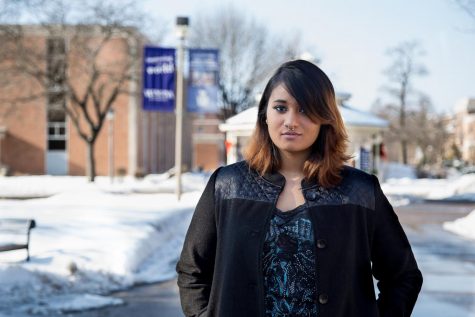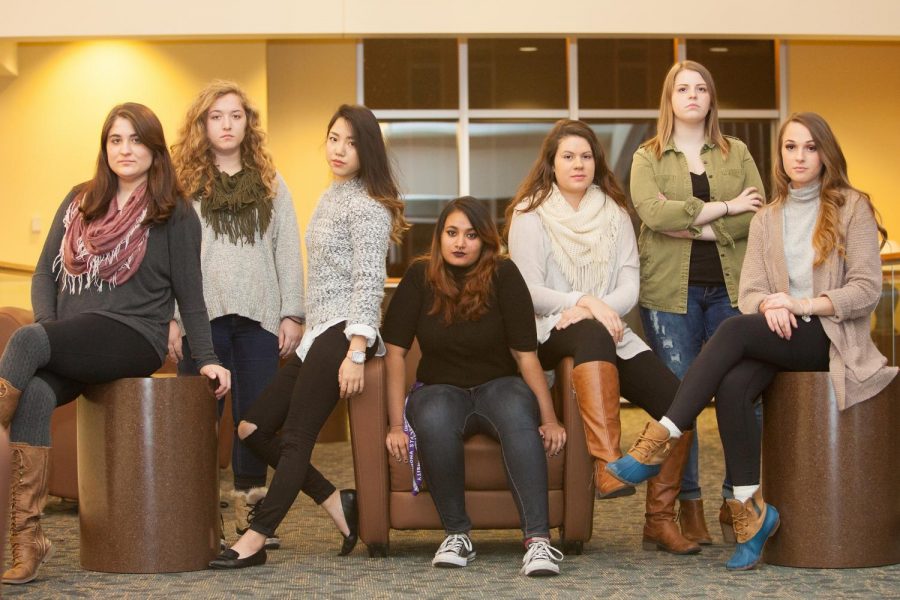Winona State responds to Title IX changes
Left to right: Cassandra, Jennifer, Risa, Jacqueline, Megan, Alexis and Sarah pose for the sexual assault survivors poster campaign. The poster campaign promotes breaking the silence around sexual assault and provides information about resources that other survivors can use to find support.
October 11, 2017
One in five students on Winona State University’s campus have had some kind of unwanted sexual contact. These are the same statistics as the national average. Title IX has changed how those who have been sexually assaulted are protected and how investigations are held on college campuses.
In 1972, Title IX of the Education Amendments Act of that year was created as a way to ensure that students would not be excluded from being a part of all aspects of public education based on their sex.
In 2011, Barack Obama and the Office for Civil Rights at the U.S. Department of Education sent out a “Dear Colleague” letter to those in education to inform faculty of universities on what the steps are that they need to take in order to properly address sexual assault on college campuses. This added new criteria about sexual assault in the 1972 Title IX Education Amendments Act.
The Obama Administration also conducted a study, titled “Not Alone,” to find what further steps public institutions need to take to protect students from sexual assault. This study shared data and statistics to name the differences between sexual violence, dating violence, domestic violence and stalking.
On Sept. 22, the U.S. Department of Education Office for Civil Rights under President Donald Trump sent out their own “Dear Colleague” letter, revoking changes that the Obama administration put into place.
One controversial change included giving universities the option to use either the preponderance-of-the-evidence standard or the clear-and-convincing-evidence standard when investigating sexual assaults.
The preponderance standard states that a sexual assault would be investigated seriously only if there is a 51 percent chance that a sexual assault occurred, that the complainant is believable and their story is possible.
The clear-and-convincing-evidence standard means that students need to provide some kind of concrete proof in order for investigations to begin.
Betsy DeVos, the current Secretary of Education, has now given public universities the option to use either of these standards, while the Obama administration encouraged all institutions to use the preponderance-of-the-evidence standard.

Jenn holds her head while she sits on a Lourdes Hall dorm bed, where her sexual violence assault occurred. Jenn mentions that no matter how much time you give yourself to regain emotional strength, “your body is the crime scene”.
Data on the number of sexual assaults at Winona State has been found consistent over the past two years through campus climate surveys led by Director and Professor of Women’s Gender and Sexuality Studies Tamara Berg.
“Winona State is just like every other campus,” Berg said.
Jennifer Manglos, a senior communication studies major with a Women’s Gender and Sexuality Studies minor, is a sexual assault survivor. She said that the fact that DeVos’ changes require students to have proof to investigate these crimes makes it more difficult for universities to punish perpetrators.
“DeVos said that these changes are ‘to ensure that everyone gets their rights,’ but survivor rights are not currently being met, even under the Obama administration’s changes to Title IX,” Manglos said. “It’s not perfect. A lot more work needs to be done to ensure survivor safety and security. These changes are detrimental to survivors.”
The DeVos’ “Dear Colleague” letter also altered who can appeal to the outcome of the investigation. Initially, only those who had been accused of a crime were able to appeal, while the Obama administration added that either the accuser or the accused could appeal.
The Obama administration also set a 60-day limit to when all processes necessary in a sexual assault investigation and trail need to take place, while the new administration has taken away the specific time limit.
While changes in how sexual assault cases are handled and investigated are on the horizon in the Trump administration, faculty and students at Winona State are continuing to support students who have been sexually assaulted.
Though President Scott Olson stated that he cannot give legal opinions, he said that Winona State prefers to continue what they have been doing in dealing with sexual assault changes. This includes using preponderance-of-the-evidence standard, which Winona State was using before the 2011 Obama administration “Dear Colleague” letter.
In two weeks, President Olson will meet with other presidents of Minnesota Colleges and Universities system, where DeVos is scheduled to make an appearance to outline her plans for Title IX. Olson himself has been a part of a group that has been lobbying her on this topic.
“It’s important for students to know that our process has not changed,” Olson said. “We encourage anyone and everyone who feels that they may have been a victim of sexual assault or sexual harassment or indeed anything to report it and bring it in to Lori Mikl’s office where it will be taken seriously and will be investigated fairly and where the institution will do its best to make sure the right thing happens.”
Olson said he hopes for patience on campus, and to keep an eye out for any changes that may happen on this issue. He also shared that the university will do everything they can to be consistent and clear with these changes and want to make the best choices for students on campus.
Berg echoed the current plans of the university that Olson had shared during his interview.
“We are continuing with our current best practices, as are supported and informed by our Office of Violence Against Women grant that we have for another two years and we are standing by the best practices that we have developed on our campus and that includes retaining the preponderance-of-the-evidence standard for our campus investigations,” Berg said.
Berg and Manglos said there are a handful of things students on campus can do to change the culture of this topic on campus, as well as support those who have been sexually assaulted on campus, according to the Obama Administration’s “Not Alone” report.
The report encouraged institutions to identify the problem on their campus and assess it, as well as mandated campuses provide prevention education and that they include and involve men in this discussion.
It also required universities to respond effectively when a student is sexually assaulted, which included providing survivors access to confidential support, having a sexual misconduct policy, training school officials, adding new protocols, partnering with the community, and enlisting researchers to find new solutions for each campus.
“Changing the culture means we need to address, not really focus on the victim not focus on the perpetrator, but focus on everybody else,” Berg said.

Senior Jacqueline stands in front of the gazebo on campus last January as a survivor of sexual assault.
Berg said that bystander intervention training is an effective way for students to make a change on campus, and that the rape acceptance myth needs to decrease. She also said that it is crucial for men to be a part of this movement because only a small percent of men are intentionally doing things when being sexually violent, and the men who do not do this and would never do this can be the ones to make a change on campus.
Berg also commends President Olson and athletic director Eric Schoh, who have been doing what they can to make a difference on campus on this issue.
While Title IX is being questioned and changed, Manglos is determined to ensure that sexual assault survivors and their allies are supported.
Manglos expressed that survivors should do whatever they need to do to take care of themselves, even if they do not report. There are resources on campus and in Winona for any survivors that need them, including the Women’s Resource Center hotline, Winona State 24/7 Confidential Gender-Based Violence (GBV) Helpline and Winona State Health, Counseling and Wellness Services.
“Just know that it’s not your fault, regardless of the situation. It’s never your fault,” Manglos said. “Healing is a process and it’s always okay to postpone it or do it right away. Healing isn’t going to happen overnight and everyone has a different healing process.”
Manglos said when supporting others, it’s important to listen to them and reassure them that they are believed. Being Prevent, Act, Challenge, Teach (PACT) trained and knowing the resources on campus to lead them to if they need it. It is most important to give survivors choices, even if it is about something small, like where to go for dinner or if they want to go somewhere for the night.
“Make sure that they are able to make the decision,” Manglos said. “[After being sexually assaulted] you feel like you don’t have control. So reassure your friends who are survivors or victims that whatever they want to do, it’s okay.”
While new changes will be coming to Title IX from the Department of Education, faculty and students on campus plan on continuing to support those who are sexually assaulted and doing what they can to ensure safety on campus. Berg shared her final thoughts on the upcoming Title IX changes and how that will affect campus.
“I am deeply disappointed by the stance this White House is taking on Title IX and on addressing gender-based violence on college campuses,” Berg said. “Fortunately, I am confident in the leadership at our institution from President Olson on down that we will continue to do the right thing to support survivors, to hold perpetrators accountable, and to make our campus as safe as it can possibly be. And that makes me very hopeful that we can continue the work we have been doing.”















































Jacob Stock • Oct 13, 2017 at 11:28 am
Thank you for covering this important topic. I was wondering, when and where will the meeting between Secretary DeVos and the MN State Presidents be taking place, and will it be open to the public?